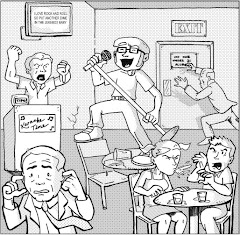After the Cape #1, March 2007, Image Comics
writers: Howard Wong & Jim Valentino
artist: Marco Rudy
letterer: Ed Dukeshire
editor: Kristen Simon
I've said it before, that the recent speculation around Anna Nicole Smith's untimely death represents an aspect of American celebrity that has pervaded our culture since the inception of mass media: our inherent need to punctuate those lives that have captured our fascination. Elvis is an excellent example of the inverse's repurcussions, of how an entire career can be adversely affected by a negative image in the declining years. Anna Nicole, and her proverbial predecessor Marilyn Monroe, inadvertently denied us that impression, thereby remaining perfect . . . at least, as perfect as they were. They certainly couldn't get any worse. Their careers, unarguably popular, are intact, and they'll always be that way.
After the Cape explores a similar phenomenon in the context of superheroes. Captain Gravity is an alcoholic and everybody knows it -- his wife, his children, the superhero and super-villain community, everybody . . . except himself. In a classic state of denial, his life has been on a downward spiral since his teammates' failed intervention, and when they kicked him off the team, he resorted to using his gravity defying powers to steal chump change with some opportunistic small time crooks. A big score instills him with a new sense of hope and he excitedly tells his wife that work has given him a raise, a short-lived celebration when those small-timers find a mastermind to frame Captain Gravity into an even deeper life of crime. Ironically, it's all pretty heavy material.
I've been looking forward to After the Cape since I read its solicitation at Comic Book Resources, and while this issue wasn't what I expected, I was nevertheless intrigued and entertained. Perhaps because of its title, I expected less of a standard, linear story and more of an expose on the concept -- a tale that explores this aspect of the superhero genre from a variety of perspectives. I expected a Behind the Music riff about Superman, what with the Kingdom Come-esque cover image. Instead, writers Jim Valentino and Howard Wong offer the idea from the inside out, setting the stage for Captain Gravity's big fall rather than introducing him at the bottom of the barrel. The culminating sense of false hope that drives his criminal activity, and his raw rejection of any help or invention, will undoubtedly result in a sympathetic, possibly tragic moment of truth.
Captain Gravity is Elvis just this side of the toilet.
Speaking of its cover, After the Cape boasts high contrast black and white art, which may be a budgetary restraint yet maintains a sense of drama and ambiance throughout the story. I assume artist Marco Rudy was inspired by the imagery of Alex Ross, specifically the sketchbook supplementals that have accompanied Kingdom Come and Earth X, as many of his characters betray similar features -- the furrowed brows, the hollowed eyes, the heavily shadowed fabrics, etc. The visual connection creates a more faithful connection to the superhero genre, although the Action Comics font styled logo seems a bit much considering a lack of any other connection to DC lore, even in satire. If anything, it's a gratuitous ploy to get folks to read the book. Hey, I shouldn't talk. I fell for it.
Then again, if you can control gravity, making someone fall for you is a small feat. Obviously, the real skill is in holding yourself up. While alcoholism has been explored in comics before, it's never been the primary catalyst for an entire series. Let's see if our hero can leapt a tall building in twelve steps.
Tuesday, April 03, 2007
Subscribe to:
Post Comments (Atom)



No comments:
Post a Comment